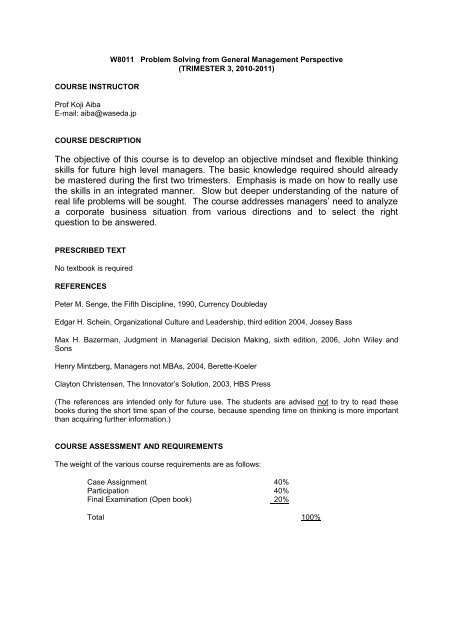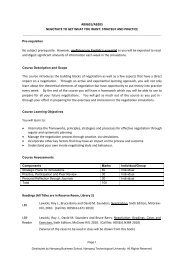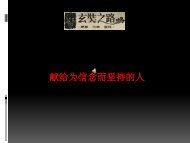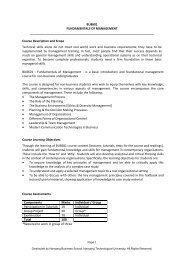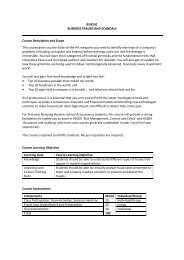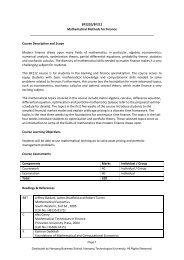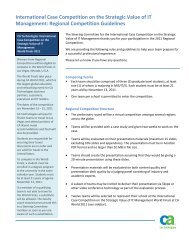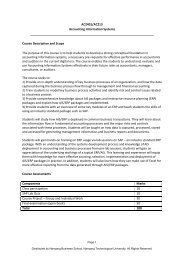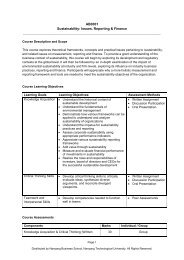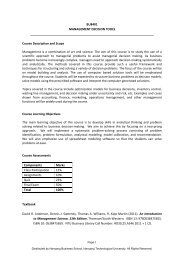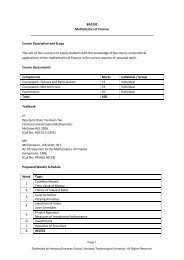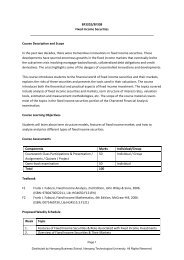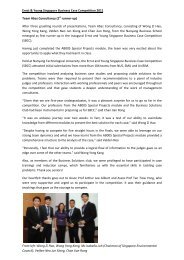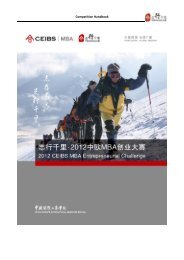W8011 - Nanyang Technological University
W8011 - Nanyang Technological University
W8011 - Nanyang Technological University
You also want an ePaper? Increase the reach of your titles
YUMPU automatically turns print PDFs into web optimized ePapers that Google loves.
COURSE INSTRUCTOR<br />
Prof Koji Aiba<br />
E-mail: aiba@waseda.jp<br />
<strong>W8011</strong> Problem Solving from General Management Perspective<br />
(TRIMESTER 3, 2010-2011)<br />
COURSE DESCRIPTION<br />
The objective of this course is to develop an objective mindset and flexible thinking<br />
skills for future high level managers. The basic knowledge required should already<br />
be mastered during the first two trimesters. Emphasis is made on how to really use<br />
the skills in an integrated manner. Slow but deeper understanding of the nature of<br />
real life problems will be sought. The course addresses managers’ need to analyze<br />
a corporate business situation from various directions and to select the right<br />
question to be answered.<br />
PRESCRIBED TEXT<br />
No textbook is required<br />
REFERENCES<br />
Peter M. Senge, the Fifth Discipline, 1990, Currency Doubleday<br />
Edgar H. Schein, Organizational Culture and Leadership, third edition 2004, Jossey Bass<br />
Max H. Bazerman, Judgment in Managerial Decision Making, sixth edition, 2006, John Wiley and<br />
Sons<br />
Henry Mintzberg, Managers not MBAs, 2004, Berette-Koeler<br />
Clayton Christensen, The Innovator’s Solution, 2003, HBS Press<br />
(The references are intended only for future use. The students are advised not to try to read these<br />
books during the short time span of the course, because spending time on thinking is more important<br />
than acquiring further information.)<br />
COURSE ASSESSMENT AND REQUIREMENTS<br />
The weight of the various course requirements are as follows:<br />
Case Assignment 40%<br />
Participation 40%<br />
Final Examination (Open book) 20%<br />
Total 100%
LECTURES, TOPICS AND READINGS<br />
CLASS<br />
NO<br />
1<br />
Introduction to Problem Solving<br />
Case “Sapphire Acoustics”<br />
TOPICS<br />
READINGS<br />
Case 1 “Sapphire<br />
Acoustics”<br />
2 Case “Merit Corporation” (included in reading 1) Reading 1 “A Note for<br />
Analyzing Work<br />
Groups”<br />
3 Problem solving in the real world Reading: 2, “The<br />
Smart Talk trap,” 3,<br />
“What is an<br />
Organization’s<br />
Culture”<br />
4<br />
Case2 ”Asahi Breweries”<br />
Case 2, ”Asahi<br />
Breweries”<br />
5 Continued<br />
Discussions on the logic flow of Asahi analysis<br />
Reading: 4,<br />
“ Distortions and<br />
Deceptions in<br />
Strategic Decisions<br />
6<br />
Case “ EMI (A)”<br />
Case B to be handed out at the end of class<br />
Case 3 “EMI (A)”<br />
7<br />
Case “EMI (B)<br />
Case 4 “EMI (B)”<br />
Reading: 5, “Musings<br />
on Management”<br />
8 Continued Reading: 6, “The<br />
Leader’s New Work:<br />
Building a Learning<br />
Organization”<br />
9 Case on Automotive Industry and case on Honda<br />
Case 5 and 6<br />
(Supplementary readings to be supplied at the end of class)<br />
10 Presentation on “The Competitive Advantages and Strategic<br />
Uniqueness of Japanese Companies-Focus on Auto companies”<br />
2
Weekend<br />
readings<br />
11<br />
12<br />
Case BIC Pen Corporation (A), supplement and (B)<br />
Discussion in teams and preparation for presentation<br />
Continued<br />
Presentation by teams<br />
(New info to be supplied at the end of class)<br />
Reading 7, “Of<br />
Strategies Deliberate<br />
and Emergent”<br />
Case 7, supplement<br />
and case 8<br />
Reading: 8, “Meeting<br />
the Challenge of<br />
Disruptive Change”<br />
13 Continued<br />
Discussion in teams<br />
Reading:9, “How<br />
Business School Lost<br />
Their Way”<br />
14 Continued<br />
Discussion<br />
15 Coping with the Complex Reality of (Business) Life Reading 10, “Hidden<br />
Flaws in Strategy”<br />
16 Continued<br />
11, “Why Do We<br />
Make Bad Decisions?<br />
EXAMINATION (Open book)<br />
Case 9 (TBA)<br />
3
DAYLY ASSIGNMENTS<br />
For reading assignments, see the table above. The assignments below are individual reports due at<br />
the start of the class. The students may discuss in study groups or by phone, but no digital data or<br />
information, such as text, charts and tables, should be shared. The reports are very short but should<br />
include all necessary arguments. It should look like an executive summary compressing the logic flow<br />
of a longer report. Exhibits attached to the report will be out of word count.<br />
Day 1-1<br />
Day 1-2<br />
Day 2-2<br />
Day 3-1<br />
Day 3-2<br />
Day 4-1<br />
Day 4-2<br />
Day 5-3, 4<br />
Day 6<br />
Day 7<br />
Short report on Sapphire Acoustics<br />
“If you were a friend of the president and learned about the situation, what would you<br />
recommend him? Why?” (Word count limit: 100 words. You have to use MS Word,<br />
word count function to prove it. Do so in all reports.)<br />
Short report on Merit Corporation<br />
“What were the problems? How could you have solved the problems?” (Word count<br />
limit: 150. Do not assume that the culture issue is the only problem.)<br />
Short report on Asahi Breweries case<br />
“Analyze the industry and evaluate the investment proposal. Give action<br />
recommendations.” (Word count limit: 400. Exhibits attached to the report will be<br />
outside the word count.)<br />
No report is required (Assignment for Asahi Breweries will be given at the end of Day<br />
2, but there will be no report for the case)<br />
Short report on EMI (A) case<br />
“Give persuasive action recommendations to the management.”<br />
(Word count limit: 250. Exhibits attached to the report will be outside the word count.)<br />
EMI (B) case (no report required)<br />
“Analyze and evaluate the situation and recommend what Dr. Powell should do.”<br />
No report is required (Assignment for Auto case and Honda case is in the package, but<br />
there will be no report for the case) Read cases and think.<br />
Report on BIC Pen Corporation<br />
“What are the issues? How do you solve the problems? In which direction do you think<br />
BIC can grow in the future? (Word count limit: 600. Exhibits attached to the report will<br />
be outside the word count.)<br />
No report is required<br />
No report is required<br />
READING MATERIALS<br />
The following supplementary readings from journals and business magazines will be provided.<br />
1. HBS note 9-496-026 “A Note for Analyzing Work Groups”<br />
2. HBR article, Jeffrey Pfeffer/ Robert I. Sutton, “The Smart-Talk Trap,” May-June 1999, Reprint 99310<br />
3. HBS note 9-399-104 “What is an Organization’s Culture”<br />
4. HBR article, Henry Mintzberg, “Musings on Management,” July-August 1996, Reprint 96407<br />
5. MIT Sloan Management Review, “The Leader’s New Work: Building a Learning Organization,” Fall<br />
1990, Volume 32, Number 1, SMR002, Reprint 3211, P.7-22<br />
6. McKinsey Quarterly article, Dan P. Loballo/ Olivier Sibony, “Distortions and Deceptions in Strategic<br />
Decisions,” 2006 Number 1. P.19-29<br />
7. HBR article, Clayton M. Christensen/ Michael Overdorf, “Meeting the Challenge of Disruptive<br />
Change,” March-April 2000, Reprint R00202<br />
8. HBR article, Warren G. Bennis/ James O’Toole, “How Business School Lost Their Way,” May 2005,<br />
Reprint R0505F<br />
4
9. McKinsey Quarterly article, Charles Roxburgh, “Hidden Flaws in Strategy,” 2003 Number 2 P.27-39<br />
10. Harvard Management Update, John Hintze, “Why Do We Make Bad Decisions?” July 2003,<br />
Reprint U0307C<br />
CURRICULUM VITAE OF THE INSTRUCTOR<br />
Education<br />
MBA, Harvard <strong>University</strong> 1980-82<br />
Bachelor of Laws (LLB,) <strong>University</strong> of Tokyo 1972-76<br />
Work experience<br />
The Boston Consulting Group (mainly Tokyo office) 1982-93<br />
Vice President 1990-93<br />
Project manager 1986-1990<br />
(Düsseldorf Office 1989-1990)<br />
Consultant 1982-1986<br />
Taiyo Kobe Bank (currently Sumitomo Mitsui Banking Corporation) 1976-1982<br />
Professor, Waseda Business School 2002-<br />
Statutory Auditor of Aplix Corporation 2006-2007<br />
Director of Board, Seiyu Corporation (Subsidiary of Wal-mart) 2007-2008<br />
Board member of Japan Association for CFOs 2001-<br />
Statutory Auditor of Dream Incubator Inc. 2006-<br />
Major Publications in Japanese<br />
“Value Portfolio Strategy, ” 1993, also translated into Chinese, “How to Transform Japanese<br />
Corporations”, 1995, ” Corporate Strategy,” 1999, “Management” 1999, “Pragmatic Case Book,” 2000,<br />
also translated into Korean, “Business Rules,” 2001 , “Problem Solving and Strategy Skills,” 2003<br />
5


